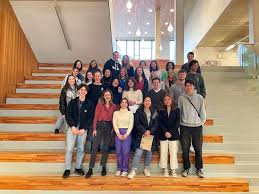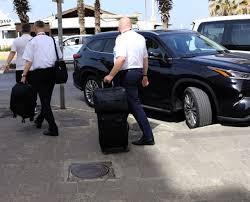- 1. Understanding Erasmus+ Funding and Eligibility
- 2. Navigating Erasmus+ Paperwork with Confidence
- 3. Travel, Accommodation & On-the-Ground Logistics
- 4. Preparing Your Documents
- 5. Your First Day in Ireland: Setting you up for Success
- 6. Support Throughout Your Stay
- 6. Returning Home With Results
- Why Erasmus Courses Ireland?
- Looking Ahead: Keeping the Erasmus+ Momentum Alive
- In conclusion …
From Application to Arrival: A Guide to Erasmus+ in Ireland

For many university staff members, participating in an Erasmus+ mobility programme is an exciting professional opportunity, but the process of turning an idea into a fully organised training experience abroad can sometimes feel overwhelming. Between paperwork, funding deadlines, travel arrangements, and accommodation planning, the path from “yes, let’s do it” to “I’m here in Ireland!” can be daunting.
At Erasmus Courses Ireland, we’ve helped hundreds of participants from across Europe make this journey smoothly and stress-free. Whether you are a faculty Erasmus+ Coordinator or an individual academic staff member, our goal is to make the process simple, clear, and enjoyable, so you can focus on what matters most: learning, networking, and experiencing Ireland.
In this guide, we’ll walk you through the key stages of an Erasmus+ mobility to Ireland, with insider tips from our experience hosting university staff from across the EU.
1. Understanding Erasmus+ Funding and Eligibility
The first step is to know what’s possible. Erasmus+ funding is available to cover the costs of professional development for higher education staff, from lecturers to administrative staff. Training courses in Ireland are eligible under Staff Mobility for Training, and your home institution can apply for funding under its Erasmus+ Key Action 1 (KA1) grant.
Applying for Erasmus+ funding and arranging a mobility in Ireland can be straightforward if you know the steps, but small oversights can delay approval or cause last-minute headaches. Below are tips for both university coordinators and individual participants to keep things running smoothly.
Tip for Coordinators:
Your role is crucial in ensuring your faculty or department’s mobility plan is accepted and runs without issues.
1. Start Early
- Funding calls have strict deadlines. Begin identifying partners and courses at least six months before your planned mobility date.
- Secure internal approval from your faculty’s Erasmus+ committee or international office well ahead of time.
2. Match the Training to Strategic Goals
- Select mobility training courses that align with your university’s development strategy, staff skills gaps, and long-term internationalisation goals.
- Choosing a course provider (like Erasmus Courses Ireland) with clear learning outcomes and alignment to EU priorities increases funding approval chances.
Learn more about our centres here.
3. Build a Strong Justification
- In your application, clearly explain how the mobility will improve teaching quality, research capacity, or student experience.
- Highlight the provider’s track record, unique offerings, and relevance to higher education.
4. Get Documentation Right First Time
- Ensure any partner agreements required are signed and dated before submission.
- Use the Erasmus+ application templates provided by your National Agency to avoid format errors.
Find your national agency here: https://erasmus-plus.ec.europa.eu/contacts/national-agencies
5. Communicate Expectations to Participants
- Make sure participants understand any language or preparation requirements.
6. Keep a Master Timeline
Check your university’s existing Erasmus+ mobility agreements. Ireland is a popular choice, and spaces can fill quickly, so it’s worth encouraging departments to submit their requests early.
Tip for Individual Staff:
Contact your Erasmus+ office to find out when applications open and what documents they require. Most universities will support your application if you can show how the training matches your professional role and institutional goals.
1. Understand the Purpose of Your Mobility
- Read your mobility’s learning objectives and know how they connect to your role at your university. This will help you stay focused during training and contribute valuable feedback when you return.
2. Prepare the Required Documents Early
- Keep your passport valid for at least six months after your planned return date.
- Have digital copies of your ID, insurance details, travel tickets, and accommodation confirmations stored securely.
3. Plan Your Travel Wisely
- Book flights early for better rates, but only after your funding and course dates are confirmed.
- Check whether you need to arrange travel from the airport to your accommodation.
4. Budget for Extras
- Erasmus+ funding covers most expenses, but you might want to allow a little extra for cultural activities, meals outside training times, or souvenirs.
5. Stay Connected with Your Coordinator
- Keep your coordinator updated on your travel plans, arrival time, and any changes.
- If issues arise (delays, lost documents, illness), they can liaise with the training provider on your behalf.
6. Research Irish Culture and Customs
- Familiarise yourself with local etiquette, transport systems, and key cultural highlights. Not only will this enrich your stay, but it will also help you integrate more quickly into the training environment.
2. Navigating Erasmus+ Paperwork with Confidence

For many participants, the paperwork can feel like the biggest hurdle. Erasmus+ documentation is essential for compliance and funding, but it’s not as daunting as it looks once you break it into manageable steps.
For Coordinators:
- Standardise Templates: Providing your group with pre-filled, institution-approved templates reduces errors and keeps formatting consistent.
- Clarify Responsibilities: Ensure each participant knows exactly which forms they must complete themselves and which will be handled centrally by your institution.
- Leverage Your Irish Host Organisation: Partner institutions in Ireland can help reviewing documents before submission, catching small errors that could delay funding.
For Individual Participants:
- Understand Each Document’s Purpose – For example, the Learning Agreement sets your study or training plan, while the Grant Agreement confirms your funding. Knowing why you’re signing something makes the process feel more transparent.
- Keep Digital and Paper Copies – Some institutions still require original signatures; others accept scanned copies. Having both on hand avoids delays.
- Check for Country-Specific Requirements – While Erasmus+ guidelines are standard across the EU, host countries may have additional forms or ID requirements.
Pro tip:
Many delays happen when participants wait until arrival to address missing signatures or incorrect details. Double-check before departure so your grant isn’t delayed.
How we help:
We provide participants with ready-made course descriptions, learning objectives, and daily timetables that can be inserted directly into application forms. This saves time and ensures your funding request is complete and clear.
3. Travel, Accommodation & On-the-Ground Logistics

Once your paperwork is sorted, it’s time to turn to the practicalities – getting to Ireland and settling in comfortably.
Booking Your Travel
- Be Strategic with Timing: Flights to Dublin, Cork, and Shannon can be cheaper midweek, especially on Tuesdays and Wednesdays. Booking 6–8 weeks in advance can secure the best rates.
- Check Baggage Policies: Some budget airlines charge high fees for extra luggage, so factor that into your cost planning.
Finding the Right Accommodation
- Student Residences & Host Families: Many host organisations in Ireland have pre-approved accommodation partners, saving you time and reducing risk.
- Location Matters: In cities like Dublin, commute times can be significant. Balancing cost with proximity to your placement site is key.
Preparing for Everyday Life in Ireland
- Banking & Payments: Many visitors use digital banking apps (like Revolut or N26) for easy, fee-free transactions.
- Transport: Apply for a Leap Card for discounted public transport in Dublin, Cork, and Galway.
- Weather & Clothing: Ireland’s climate is mild but changeable. Pack layers and a waterproof jacket, even in summer.
- Cultural Tips: A smile and a “How’s it going?” go a long way in Ireland. Don’t be surprised if strangers strike up friendly conversations on buses or in cafés.
4. Preparing Your Documents

Paperwork is often seen as the least exciting part of Erasmus+, but it’s also the backbone of a successful mobility. Missing documents or incomplete forms can lead to funding delays or even loss of eligibility, so getting this part right is essential.
Key documents
Learning Agreement (for students) / Mobility Agreement (for staff). Outlines the planned programme of activities, objectives, and expected outcomes.
- Grant Agreement: The contract between the sending institution and the participant detailing funding amounts and conditions.
- Confirmation of Attendance: Issued by the host institution at the end of the mobility to verify participation.
- Final report: Required by the National Agency for funding closure and evaluation.
Tips for coordinators
- Create a document checklist for every participant and tick items off as they are completed.
- Schedule document submission deadlines earlier than the official requirements to allow for corrections.
- Assign a dedicated contact person for each group to manage communication with the host organisation in Ireland.
Key documents for participants
- Passport or ID valid for the duration of your stay.
- European Health Insurance Card (EHIC) or private health insurance details.
- Travel tickets and accommodation confirmation.
- Emergency contact list and local support numbers.
Tips for participants
- Keep both digital and paper copies of all documents in case of loss or technical issues.
- Learn basic phrases in Irish English: Sometimes local terms can be different from what you expect (e.g., “ Garda” for police).
- Make a note of all important deadlines and submission dates in a calendar app with reminders.
With clear organisation and open communication between coordinators and participants, Erasmus+ paperwork stops being a barrier, and becomes simply another step toward an exciting and well-supported experience in Ireland.
5. Your First Day in Ireland: Setting you up for Success
Stepping off the plane in Ireland is the start of an exciting chapter — but it’s also a moment when many Erasmus+ participants feel a mix of excitement and uncertainty. That’s why we make sure your very first day here is smooth, comfortable, and full of the kind of warm Irish hospitality you’ve heard so much about.
Whether you’re in Dublin, Cork, or Galway, our goal is for you to feel settled, supported, and ready to make the most of your mobility from day one.
A Warm Welcome and Easy Transfers
We know that after a journey, the last thing you want is to navigate unfamiliar transport with heavy luggage. That’s why we can arrange airport pick-ups for individuals or groups, taking you directly to your accommodation. For those who prefer public transport, we can provide step-by-step guidance on the easiest routes, including how to use local travel cards and where to buy them.
Comfortable, Pre-Checked Accommodation
Before you even arrive, if our centres have arranged your accommodation, we ensure that it is all checked and ready. Whether you’re staying in student-style housing, shared apartments, or homestay accommodation, you’ll have clear instructions for check-in, local amenities, and how to settle in.
Welcome Briefing & Orientation
Your first day includes a short welcome meeting which could cover:
- Key safety information and emergency contacts.
- Tips for using your free time well, including recommendations for cultural sites, walking routes, and local events.
Meeting Your Erasmus+ Community
For groups arriving together, we often organise a welcome coffee or informal meet-up, giving you a chance to meet other participants and share first impressions. This early connection helps you feel part of a supportive network, especially if you’re in Ireland for several weeks.
Exploring the Neighbourhood
Your first day is also about getting your bearings:
- We’ll suggest a short walk to explore your neighbourhood, pointing out useful spots like bus stops, shops, and green spaces.
- For those arriving in major cities, we can recommend easy “first day” activities so you can enjoy Ireland’s atmosphere without feeling overwhelmed: perhaps a stroll by the River Liffey in Dublin, a walk around Cork’s English Market, or a sunset at Salthill in Galway.
Feeling Confident and Supported
By the end of day one, our aim is for you to:
- Know how to get to your training or placement.
- Feel comfortable in your accommodation.
- Have ways to contact us for help at any time.
- Feel excited for the days ahead, rather than stressed by the unknown.
In short — we take the “first day nerves” out of the equation, so you can focus on learning, connecting, and experiencing everything Erasmus+ in Ireland has to offer.
6. Support Throughout Your Stay
The Erasmus+ adventure doesn’t stop once you’ve unpacked your bags. In many ways, it’s only just beginning! Whether you’re here for a week-long training course, a month of research collaboration, or a longer teaching mobility, the right support can make the difference between a stressful experience and a truly transformative one.
At our training centres in Dublin, Cork, and Galway, we pride ourselves on offering wraparound support that goes far beyond the classroom. Here’s what you can expect during your stay in Ireland:
A Dedicated Contact Person
From the day you arrive, you’ll have a named staff member who’s there to answer questions, troubleshoot issues, and help you navigate both your training programme and life in Ireland. Need to adjust your timetable? Want recommendations for a weekend trip? Your contact person is just an email, WhatsApp message, or chat away.
Academic and Professional Guidance
Our trainers and coordinators are always available to clarify course content, discuss how your learning applies back home, and connect you with others in your field. We encourage participants to share their own expertise too. Often, the most valuable insights come from peers in different countries facing similar challenges.
Ongoing Language and Cultural Support
Even if English isn’t your first language, we’ll help you feel confident communicating in and outside the classroom. From language tips to cultural do’s and don’ts, we’ll ensure you feel comfortable in meetings, social situations, and local community interactions.
Wellbeing and Practical Assistance
Travelling abroad for professional purposes can be intense. That’s why we check in regularly to see how you’re doing — both academically and personally. We can help with practicalities like booking day trips, finding a pharmacy, or navigating Irish public transport, but also with emotional wellbeing, such as suggesting quiet spaces, local wellness activities, or peer meet-ups.
A Warm, Inclusive Community
Perhaps the most memorable part of an Erasmus+ mobility is the friendships and professional networks you build. We foster an inclusive atmosphere where everyone is welcome, regardless of background or role. Many participants stay in touch long after their training ends, leading to future collaborations and even return visits to Ireland.
6. Returning Home With Results
Your Erasmus+ journey in Ireland doesn’t end the moment you board the plane home – it continues in the skills, experiences, and connections you take with you.
For English language students, this might mean:
- A tangible boost in language proficiency, particularly in academic or workplace English.
- Greater cultural awareness and adaptability, which employers increasingly value.
- Academic credits or completed modules that contribute to your studies at home.
For teachers and education professionals, returning home may involve:
- Integrating fresh ideas, methodologies, and teaching resources discovered in Ireland into your own classrooms.
- Sharing your experience with colleagues through workshops or staff meetings, helping your whole institution benefit from your mobility.
- Building on partnerships formed during your stay to create ongoing collaboration between your home institution and Irish organisations.
Tip: Before you leave Ireland, gather all relevant certificates, contact details, and examples of work completed. These will be useful for updating your CV, applying for future opportunities, or demonstrating impact to your institution or funding body.
Your Erasmus+ mobility is a professional and personal investment, make sure you showcase it. Add your experience to LinkedIn, update your Europass CV, and consider writing a short reflection or blog for your organisation’s newsletter or website.
Why Erasmus Courses Ireland?
Over the years, we’ve hosted staff from universities in more than 20 EU member states, covering a wide range of faculties from humanities to engineering. Our participants tell us that what makes us different is our attention to detail and personalised support.
When you choose Erasmus Courses Ireland, you’re choosing a trusted partner who understands the Erasmus+ process from start to finish, and who will make your mobility to Ireland not only simple, but unforgettable.
Looking Ahead: Keeping the Erasmus+ Momentum Alive
Many participants find that Erasmus+ is a gateway, not a one-time event. Once you’ve returned home, look for ways to keep the momentum going:
- Stay connected with your Irish hosts and fellow participants. These contacts could lead to new projects, job opportunities, or joint research.
- Engage your community by giving talks, organising cultural exchange events, or mentoring new participants who are preparing for their own Erasmus+ experiences.
- Collaborate internationally by proposing joint initiatives between your home institution and Irish partners and colleagues you meet on your mobility programme, supported by Erasmus+ Key Action funding.
The skills, confidence, and perspective you’ve gained are stepping stones toward bigger goals, whether that’s advancing your career, contributing to international cooperation, or building a more connected Europe.
In conclusion …
Taking part in an Erasmus+ programme in Ireland is more than just a trip: it’s a transformative journey that blends professional growth, cultural immersion, and unforgettable experiences. From navigating the application process to your first day on Irish soil, every step is an opportunity to learn, connect, and thrive.
Ireland’s welcoming communities, rich heritage, and world-class educational institutions make it an ideal Erasmus+ destination, whether you’re a student, teacher, youth worker, or professional seeking skills development.
If you’re ready to start your Erasmus+ adventure in Ireland, now is the perfect time. Begin by exploring the latest Erasmus+ calls for applications, speaking with your organisation’s mobility coordinator, and researching Irish partners or training providers that align with your goals.
We can help you every step of the way, from finding the right Erasmus+ programme to supporting your arrival, stay, and follow-up. Get in touch to discuss your plans and discover how you can make the most of Erasmus+ in Ireland.
Contact us if you would like more information. info@erasmuscoursesireland.eu
